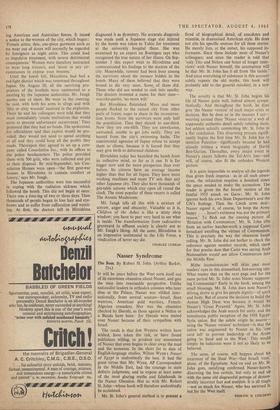Nasser Syndrome
The Boss. By Robert St. John. (Arthur Barker, 21s.) Ir will be years before the West sorts itself out of its enormous obsession about Nasser, and gets the man into reasonable perspective. Unlike nationalist leaders in orthodox colonies who later dine at the Palace, Nasser was vilified inter- nationally, from several sources—Israel, Suez warriors, American cold warriors, French- Algerian crusaders. Nor was the obsession checked by liberals, as those against a Nehru or a Banda have been: for liberals were muted over Nasser because of their sympathies with Israel.
The result is that few Western writers have wished, have taken the risk, or have found publishers willing, to produce any assessment of Nasser that even begins to clear away the mud and the nonsense. In the short list to date of English-language studies, Wilton Wynn's Nasser of Egypt is undoubtedly the best. It had the great virtue that Mr. Wynn, AP Correspondent in the Middle East, had the courage to state definite judgments, and to expose at least some of the most glaring myths and falsehoods in the Nasser Obession. Not so with Mr. Robert St. John—whose book will therefore undoubtedly be acclaimed.
Mr. St. John's general method is to present a flood of biographical detail, of anecdotes and minutiae, in dramatised American style. He does not cite his specific sources for all these stories. He merely lists, at the outset, his supposed in- formants. Since these include most of Nasser's colleagues; and since the reader is told that `only Tito and Nehru can boast of longer inter- views' with Nasser himself, the assumption will be that Mr. St. John has it all from 'the inside.' And since everything of substance in this account subtly repeats the old myths, this book will probably add to the general mischief, in a new way.
The novelty is that Mr. St. John begins his life of Nasser quite well, indeed almost sympa- thetically. And throughout the book, he does give 'the Nasser version' of each major crisis or decision. But he does so in the manner I say— weaving around these 'Nasser versions' a web of supposedly authentic detail subtly refuting them, but seldom actually committing Mr. St. John to a flat conclusion. This disarming process signifi- cantly begins the first time Mr. St. John has to mention Palestine—significantly because he had already written a warm biography of David Ben-Gurion. Thereafter, every major event in Nasser's career follows the Tel-Aviv line—and will, of course, also fit the orthodox Western picture.
It is quite impossible to analyse all the legends thus given fresh impetus: as in all such obses- sions, the refutation requires a hundred times the space needed to make the accusation. The reader is given the flat Israeli version of the fateful 1955 attack on Gaza : Mr. St. John ignores both his own State Department's and the UN's findings. Then the Czech arms deal: Nasser signed it, of course, `to keep the Army happy . . . Israel's existence was not the primary reason.' To flesh out the ensuing picture of `flirtation with Communism,' Mr. St. John lifts from an earlier hatchet-work a supposed Cairo, broadcast extolling the virtues of Communism. This is precisely the way the obsession keeps rolling. Mr. St. John did not bother to check the reference against monitor records, which show for that precise date that Cairo was saying Arab Nationalism would not allow Communism into the Middle East.
Blithe inconsistencies will skim past most readers' eyes in this dramatised, fast-moving tale. What matter that on the next page and for the same period Mr. St. John notes Nasser suppress- ing Communists? Early in the book, among the small blessings, Mr. St. John does note Nasser's driving desire to give his people dignity--of spirit and body. But of course the decision to build the Aswan High Dam was because it would be Nasser's 'Great Pyramid.' Again, Mr. St. John acknowledges the Arab search for unity, and the tumultuous public reception of the 1958 Egypt- Syria union. But the subtle origin he asserts— using the 'Nasser version' technique—is that the union was engineered by Nasser as his 'one card left' to prevent leadership of the Arabs going `to Saud and to the West.' This would simply be ludicrous were it not so likely to be believed.
The same, of course, will happen about his treatment of the Sinai War—that Israeli 'rout, alone, of the Egyptians. And on and on Mr. St. John goes, satisfying confirmed Nasser-haters, disarming the less certain, but only to end up with the same old disgraceful pottage of demon- strably incorrect fact and analysis. It is all tragic —not so much for Nasser, who has survived it, but for the West itself.
ERSKINE. B. CHILDERS


































 Previous page
Previous page